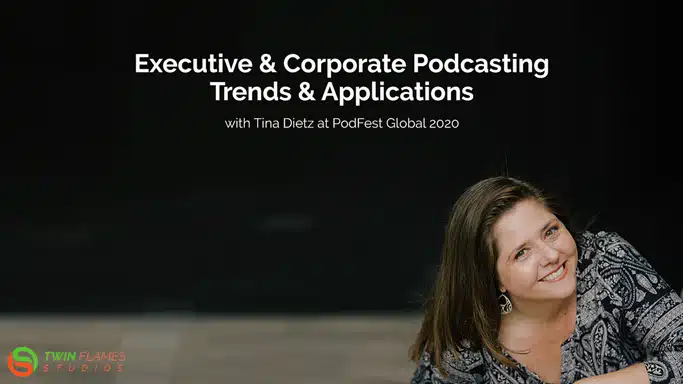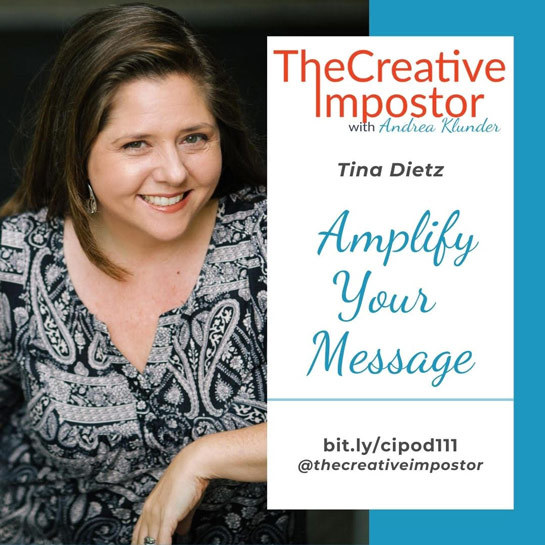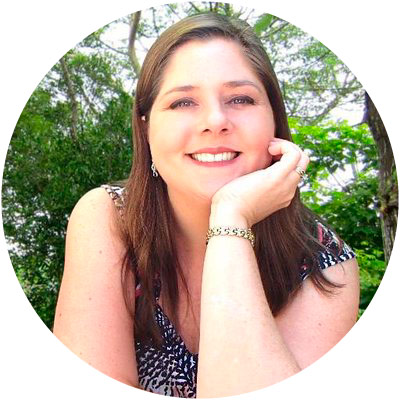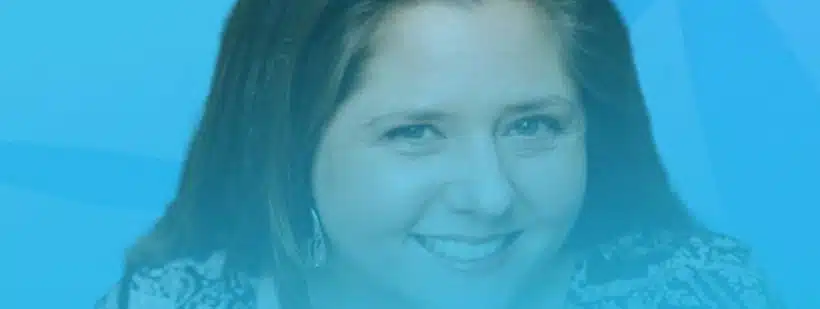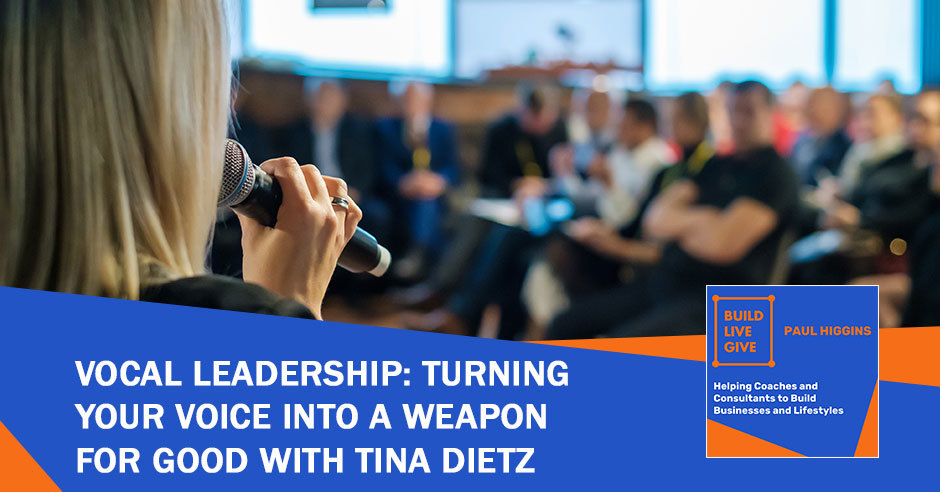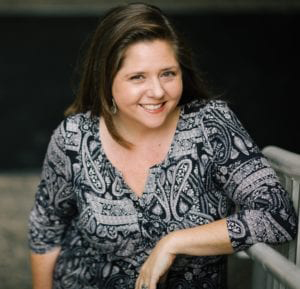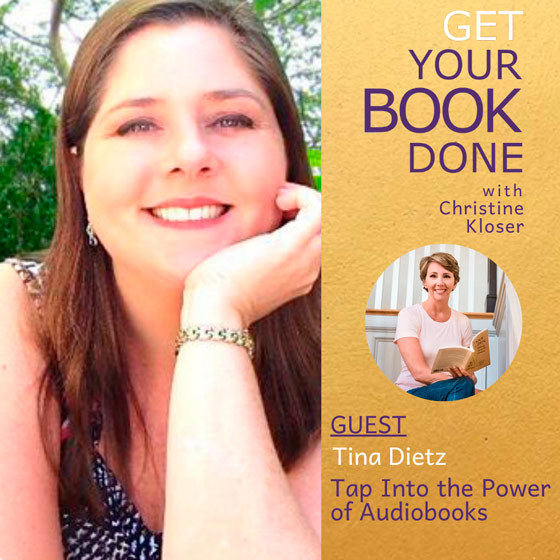Executive & Corporate Podcasting Trends & Applications – Tina Dietz
Presentation for PodFest Global 2020
Chris KrimitsosI've known Tina for quite some time—she actually was very active in our local group and has helped quite a few of us. And she's gotten into the B2B niche. So, Tina, if you'd like if you want to just share your screen, and then we'll open it up to Q&A.
Tina DietzYeah! Sounds good.
So, the floor is yours.
Why thank you.
Hi, everybody! Thanks for joining us here today. I'm excited to talk with you. And I'm not much of a PowerPoint fan, but I'm gonna do my best here.
What I'm really excited about, though, is just having an opportunity to talk with you all, and have some Q&A afterwards, because this is an area—Executive and Corporate Podcasting—that I got into… Well, I started talking about it about five years ago now because I was in podcasting, and looking at podcasting trends, and where I saw it was going, I knew it was going to take a while for larger organizations to get into podcasting.
But, like with any trend, it was almost inevitable that it was going to happen.
So, let me back up and share a little bit more. It's really about how to give a nameless, faceless corporation human personality. And this is about half my more executive team. And what we do at Twin Flames Studios is we amplify the messages of trusted brands of leaders, sometimes really well-established entrepreneurs. And we do that in three ways:
- Through full-service podcasting, getting things going, very high touch, kind of white glove, concierge service, podcasting, and ongoing production
- I, one-on-one, work with executives and CEOs on vocal leadership—which I'll touch on a little bit later when we talk about podcast guesting
- And we also do nonfiction audiobooks. Full production, publishing and distribution.
So everything audio, to get your voice out to millions of people.
And I've been building businesses for more than 20 years. I started my career as a therapist, but I grew up as an entrepreneur. And I never met a microphone I didn't like, I say all the time. So, eventually what happened is, after building businesses in about 20 different industries in eight different countries over the course of years as a consultant and a coach, I felt this pull towards doing more with podcasting, doing more with audio, that was where my heart was.
And I had this epiphany that if I could work with enough leaders, who are doing enough amazing things in the world with low hanging fruit like podcasting, and audiobook—some of the lowest hanging fruit for people to start to change their lives—then there was a good chance, you know, what was important to me, I can make a bigger impact in the world, leave the world a better place than I found it.
So that's why we do what we do. We have a global team. We've got folks overseas, we get folks here in the US and Canada, Portugal, Scotland, and I adore my team. So, I love to show them off whenever I can.
So Corporate Podcasting trends—how and why are companies using podcasting.
And like I said, most companies are—well, they're familiar with what podcasting is. But getting it into their own systems is a little different. Because how corporations handle their marketing is quite different than how entrepreneurs handle their marketing. And this was actually a learning curve for me, being a very pure entrepreneur. With all the businesses I've owned, I actually don't come from a corporate background at all. It was my ability to be flexible, and for my company to be flexible, that has really made this work in the corporate and in the B2B space.
So, what we found is that companies are using podcasting for a number different reasons. We're going to break it down, but they're primarily using it in three different ways and wanting to use it in three different ways.
So External Podcasting, which is the type of podcasting, of course, we're all the most familiar with, out into the universe available to everybody. Internal Podcasting, which we'll go into a little bit more, that is when a podcast is only available to the people inside of a company. And Podcast Guesting.
Let's break down these three—and I'm going to move through these slides as quickly as possible so we can get to the juicy meat of the matter talking about what you're most interested in and how it can serve you best.
External Podcasting, of course, they're generating brand awareness. If you look at the research on sticky branding or sticky advertising—it means when it's not directly an ad necessarily, or maybe it's something more narrative of a mention or it's a brand that gets featured in a podcast—that really is the stickiness that sticks to people. And so, they find that with podcast advertising or podcast branding, people who listen to podcasts are about 70% more likely to do business with a brand mentioned on a podcast or a brand offering a podcast. So, very important.
Attracting new clients and customers is what most of us are trying to do in podcast and podcasting on the business side of things. So, in this case, we're not talking about narrative podcasting, we're not talking about NPR style, business podcasting. That is a trend and I think what some of the people who do it best are “Pacific Content” out in Vancouver—they run Charles Schwab's external podcast, they run Facebook's external podcast; I had the pleasure of interviewing one of their executives recently, and I have tremendous respect for what they do. But every one of those episodes is tens of thousands of dollars in production, because it is a full-time, massive deal.
So, most of the podcasting we're seeing externally, with corporate, with B2B, is not quite in that range. We can—we do see that sometimes in enterprise level companies, like Facebook, like Charles Schwab, some other large, large corporations. But companies that are in, say, the three to $35 million range—some of them maybe even considered, you know, small to mid-sized business, rather than super large corporations—they're really looking to expand their presence in a way that allows them to keep their humanity. You know, remember a lot of these are well established businesses, they're used to doing their marketing and their networking, face-to-face or as we say, belly-to-belly. And so podcasting is very appealing to these companies, particularly at this time as they're having to pivot and still wanting to keep the relationships, in their marketing, in their networking, and particularly creating relationships with industry influencers to widen their professional network.
Very rarely do we ever find that if you reach out to somebody and ask them to be on your show, or any of our companies, they reach out to an influencer in their industry—lots in finance, in particular that we work with—that somebody turns them down. It's basically “Hey, would you come and have a really friendly conversation with me for half an hour about things you're most interested in and passionate about?” Not a hard sell. So, our clients get really thrilled at having this media platform to share, that allows it to open doors for them.
And of course, that leads to creating collaboration. My favorite, favorite value out of B2B and Corporate Podcasting is what happens after the interview. Yes, there are audience members; yes, you have downloads; yes, we have, you know, growth. And we're generally not looking at podcasts that are necessarily in the thousands of downloads per episode, because we're looking at very niche podcasts. And we are also looking at the collaboration and the relationships that happen with the guests—between the guests and the host between, the guests and the company—as these podcasts come along. It does improve SEO to the websites. SEO is one of those things that seems like more magic than anything else these days. A lot of the things we all knew to do years ago with meta tags, and keywords, and all this other stuff… It's really kind of gone away and really gone the way of organic.
So, corporations are using the podcast to generate long form content that can then be repurposed into transcript-based articles on their website—which are fantastic for SEO, particularly paired with a few other important pieces. So that's External Podcasting—the main reasons and why—we're seeing for External Podcasting.
Internal Podcasting is another animal, and this is a rising area. It's just starting to come forward and flourish a little bit, particularly in enterprise-sized companies. So, this has more to do with development and reinforcement of company culture. Culture development is key to things, like you know, making sure that things actually get done. Efficiency, particularly now that everybody is working from home, or so many people are working from home; it's how we can create a little bit more glue, and have people not feel quite as alone or lonely.
And it also really helps to prevent things like screen fatigue: if you can listen with your earbuds while you're doing the dishes, or taking your dog for a walk, you don't have to be staring at a screen like you are all day for regular work. And screen fatigue is a real thing—it has shown to decrease productivity, it increases a certain number of health risks in a big population. And corporations are always looking at corporate wellness inside of their corporate company culture. So, this is actually more to it than meets the eye when we think about culture.
It's also great, of course, for dissemination of important information. We're moving fast. There's a lot of town hall meetings that happen inside of companies, or they're rolling out new products, or particularly with some of the companies we work with in the pharmaceutical/healthcare side of things, everything's changing right now with Coronavirus, and people need to be kept in the know. Podcasting internally is a way to disseminate that information in a more intimate way than a newsletter. And also in a more human way, than they’re used to, you know, providing this, you know, very kind of cold, documented information. We're still seeing people doing everything written, but adding on the voice, adding on the relationship, and the warmth.
Also, to educate and inform teams, particularly sales teams as they're rolling out new products, features of those products, how to sell them, who to sell them to—issues that might be coming up talking about your sales numbers. A lot more interesting to celebrate your wins, by meeting your sales goals over a podcast and to hear somebody announcing your name—it's like “Hey, a big shout out to John Smith! And, you know, Amelia, for you know, blowing away the sales numbers this month, you know, make sure when you see them in the hallway today, you know, give them a shout out, send them an email.” It's great to hear that. That celebration, acknowledgement of achievements is a really, really big one—who doesn't love to hear their name being mentioned by leadership, right, or being interviewed?
And the sharing of stories and inspiration, particularly Leadership Development. Leadership Development is the biggest area we're seeing for internal podcasting, and in internal employee resource groups. And I'll talk about a specific example in a minute about that.
So, I wanted to dive in and talk about a couple of specific instances where we can see how Corporate Podcasting is being used, you know, directly. And so, we have been working with the folks at Tri-Merit. They're a corporation outside of Chicago, and they have a very, very niche business. They had no marketing team up until about a year ago, and their marketing team actually contacted us to help with the podcast. They find R&D tax credits for technology companies. Can you hear the crickets, thinking about how you would create podcast content about this?
But what they do mostly, is they have relationships with CPA firms. That's where they generate most of their business. And they are passionate about the world of public accounting. Again, not something I would ever find myself naturally drawn to be passionate about, but these guys are thrilled, and finding the stories in the public accounting world that are unique, that are interesting—they're getting them out there. And they're using this as a beautiful networking tool. You have never seen a more excited group of folks talking about public accounting than these guys. And they do fantastic work in the world. So, this podcast for them has been the hub of their content marketing, allowing them to then create social media, allowing them to then follow up with their guests afterwards, and generate collaborative opportunities, generate other guest speaking opportunities. All kinds of networking happens when the host or their team follows up with these guests after the fact.
Now let's talk a little bit about Internal Podcasting. I have to talk about the Podcast Inc. conference, which is going to be online this fall. And I don't know if any of you know Jennifer Crawford. Jennifer Crawford is the founder of DC PodFest. And you know, Jennifer and I have known Chris for years, and know the folks from She Podcasts for years. And there's this wonderful collaboration and cross promotion that happens in the background with all of these podcasts’ conferences, which I love. And Jennifer saw a need in the industry to have a one-day conference specifically in this area, because it really wasn't being addressed a whole lot of places. It's very, very niche.
And so, what we did when we moved the conference from May to November, is—I went out and I said, “Jennifer, why don't we do a limited series podcast on Internal Corporate Podcasting and use this as a lead up?” So, this just came out about two weeks ago. And we're just ramping up the promotion of the conference. But if you want to look up PodcastInc.co/podcast, you can find this and listen to these episodes from different aspects of the Corporate Podcasting world specifically talking about Internal Podcasting, but also Corporate External Podcasting sneaks in there as well.
So then we talk about things like security and the use of a podcast intranet. One of the biggest issues for Corporate Podcasting is security. And so, platforms like PodBean, Blubrry, and Libsyn all have internal podcasting capability, and you have to find out what works for you. What we're finding is that these corporations want to use their already existing intranet to disseminate podcast information. And that's actually what we're doing with the folks at Novo Nordisk right now developing an internal podcast with them, for their women in leadership employee resource group. And what's cool about that is, as we're getting further into the process, the folks from the women in leadership resource group are reaching out to the other employee resource groups to see about developing a collaboration so that the podcast can live over time.
It's a very different development art—for those of you who work with podcast show development—then an external podcast. It's a much slower process, for the most part, and also there's a lot of little baby steps. So, what we've learned in this process, in the back end, is just to let things play out and have some patience. But people are really, really coachable, really, really interested in learning, and very excited about making their workplace better. So it's very, very cool.
One of the ways we're using podcasts a lot in corporate, both Internal and I'll also reference back to External, is Limited Series like this podcasting. Podcasting doesn't have to go on forever: For companies that feel like it's a high risk to commit to a full year or an ongoing podcast, we work with them on a limited series. A to 10 to 12 episodes to start, and we say “You know what? If this doesn't work out for you, if you don't feel like you want to keep going, then you've got a really great marketing asset and a series that you can use.” So, we always bring up seasons, we always bring up limited series podcast, and we find that most of the time when they get into the groove, they do want to keep going.
We also see in Internal Podcasting, the use of External Podcasts for internal purposes. So, you can repurpose the material you're sending out to folks, and make sure that your team, you know, is actually getting that information. And we're starting to develop databases of podcast information for say a group of financial advisors to then be able to keyword-in and then send out articles, and podcast episodes, specifically to their clients and really use the podcast as a resource.
Podcast Guesting—we're just going to check on this real quick. This is some of the companies that I've worked with, some of their executives, in one capacity or another around their vocal leadership and/or Podcast Guesting. And so, Podcast Guesting, we're finding a lot of usage for executives who are looking to set themselves apart, to have third party credibility, to develop their personal brand, and to do personal leadership PR, which is different than company PR. I work with a wonderful company out of Manhattan, and they help leaders get their leadership profile amplified. And we do a lot of work with their folks around getting them prepared to be on a podcast knowing that they can have this laid-back intimate, conversational relationship. They're not teaching, they're not reporting. They're in a relationship with the host. And we work with them heavily on their storytelling, so that they're not boring guests. And they come across as the people they really are, which is warm and professional, and really out to make a difference in the world. And that conversational interview style and format makes this possible. So, Podcast Guesting we're seeing a lot of rise in the director and above level of executives in corporations.
Okay! 20 minutes.
So all right, and I wanted to leave 10 minutes for Q&A, and seeing if there's any other examples we want to talk about if we want. You guys can go to TwinFlamesStudios.com/PodFest—I've got a bunch of materials for you there. I'm not a funnel girl. Don't sell things via email. But I do have our Vocal Leadership Workout, our package on How To Be a Guest and more podcasts, and some additional articles on Corporate Podcasting that we will just send you in an email if you go to that particular link.
That's it.
Awesome, Tina. So I’ll put it back to speaker view, if you could just unshare for a second there.
You’ve got it.
Alright, so we have a couple questions. When it comes to Internal Podcasting within a corporate culture, how do you know what to charge? Is it per minute, or? Because you're dealing with very big companies—like how do you figure out what to charge?
Yeah, so with these large companies, we're generally not dealing with the umbrella of the company; we're dealing with a small section of a company. So, these Employee Resource Groups have their own budget. So, the first thing is to find out what are their budgets to work with. They don't have tremendously large budgets, and if you can work with them—I usually work with them on a consulting basis and then go from there. Because many times they have internal resources even to do the editing and things like that. They need to know how to get things going.
So, an internal podcast, is that open on an Apple feed? Or is it, you know what I mean, so it's internally?
Yeah, so these are being—
How do you set them up? I'm just curious.
Well, it's actually, again, because these are larger companies, they want to handle the tech themselves. So, it's really a matter of teaching them, showing them how to create the content, how to manage the workflow. These are a lot of things we do, you know? Conceptually, how do you internally market a podcast? And then it requires interfacing with multiple departments to actually find, you know, work with them to get the show loaded up onto their intranet. Like I said, there are the—
That’s right, they all have Internet and MI Departments, computer guys, you know, people.
Yeah, yeah. So, it's a different animal, you're not going up on a hosting platform, unless they do want to use Blubrry or PodBean, or Libsyn—are the big three right now that have Internal Corporate Podcasting platforms. We're gonna see that happen more in mid-sized companies that don't quite have intranets, but still want to have control and security.
So then you're seeing that… I found it interesting you're seeing a lot of C-Level executives wanting to grow their brand by going out on other podcasts—you're seeing that?
Yeah, there's an interesting point in an executive’s career—you're rising up in these in these large industries, you know, they've distinguished themselves and they've kind of hit a certain level and to go from say, what we call a Director Level executive, into a C-Level executive really requires distinguishing oneself with Thought Leadership in some way.
And so, Podcast Guesting is a way to distinguish oneself on Thought Leadership, that is outside the company. You know, there's an old saying that says, you know, “it's hard to become a hero in your own hometown.” So, if people know you really well, they think they know you. Well, if you're out there, and all of a sudden, you're on a podcast or a bunch of podcasts as a guest, that gives you a third-party credibility in your leadership and your development of your Thought Leadership. This is usually paired with a whole package of executive PR, of articles, or press releases, or other types of materials, that kind of all go together to help develop somebody's leadership. Getting on Boards of Directors is another really big thing. And when boards go out and research potential candidates, one of the things they look for is have they done media, and most of these folks haven't done any media because most of the media that's taught at a corporate level is high pressure crisis media.
You’re right, “how to protect yourself when everything hits the fan.” That's true. There's no… This is a… I have to tell you… This is… The more you talk, it's like the beginning of a new era, because you're right, the C-Level executives are only trained, “Don't talk to media, unless you talk to your PR department before you go out there.” Now, they're being proactive, and they're interfacing with podcasts. And I guess they also have to build their personal brand, because who knows how long they'll be an executive with that company till the next one. And, you know, there's—
Yeah, there's a fair amount of mobility and talent even, in these times, you know, top talent is something that companies are always looking to retain. It's a big issue. And we find that podcasting is a way to really bring out their voice not so much in a technical way. Working with the executives on their storytelling is one of my absolute favorite things, to have them go from this kind of teaching reporting style, that they're used to doing in meetings and things like that, and kind of teasing out the humanity. And the really cool thing is that once they learn that, now they're bringing it back to their teams and having different conversations with their teams. And that's what we go deeper into Vocal Leadership training.
So, this is really a cutting edge field of consulting, if I hear you correctly, like a media training, which they always have, but on the podcasting side, and you're at the forefront of it.
Yeah, I'd like to think so.
No, you are I mean, it's only going to grow as we move forward. What trends are you seeing with corporations and B2B type stuff? So, there's Internal Podcasting going on, you're doing external facing… Any other trends that you see? Obviously, they're trying to build their PR cred by going on other podcasts shows—
Yeah, what we're seeing a lot is that the internal marketing teams in these companies really, really want to do podcasting. I spoke at a conference a little over a year ago in Scottsdale, big B2B conference, had a packed room of 100 people speaking at a panel, and two thirds of the people in the room raised their hand when they said, “Are you trying to start a podcast in your company?” And they were running into issues with time, they were running issues with knowledge, they were running issues with budget.So coming in and being able to stay the course—these are, of course, much longer relationship building sales cycles than, most entrepreneurs, generally care to go with. I have people ask me all the time, “So can you introduce me to your people at GE so I can be a corporate, you know, trainer there?” And I'm like, “That's not how this works.” It's not the warm introduction cycle that we're used to as entrepreneurs to build our network. So, there's a lot, there's a fair amount more to it than that. It's a fascinating world, but it's definitely growing.
Yeah, a few years ago, I had, I was approached by a big $800 million, like trust, and I just remember, for them to make a decision was like 10 different committee meetings, and they still hadn't decided and they said, “Oh, this is too cutting edge.” I'm like, “This is actually not”—this was just a couple years ago—and I’m like, “It's not cutting edge. And you guys have money by the time you implement it,” you know, but it's just amazing to see how they make decisions. And you’re right. It's not the entrepreneurial world.
No, they’re much more risk-averse.
So yeah, when you do get the contract, because there's a huge lead cycle in this kind of field. So, I'm excited for what you're doing.
Thank you.
Tina, your numbers—we started at like, 50, we ballooned to 70. We have 60-something people here is amazing. I just want to give a shout out to Ross Brand, Al Mega, Dr. Ellen, Rachel Hernandez, commenting, chatting.Anything that you see for artificial voice in corporate or is that going to take time? Like the [Alexa] skills, are you seeing anything there?
Any artificial voice—any truly artificial voice that it's not a human voice—we find a lot of resistance to and I also have a tremendous amount of resistance to it. Because to me, that is the polar opposite of what podcast gets used for. You know, when you and I worked together and I did a bunch of the interviews for The Messengers movie—if you haven't watched it, watch it—you know the thing that came up across all those interviews that we did was the word intimacy and podcast and creating intimacy. And so, an AI voice is the opposite of intimacy. And I don't think we're going to see mechanized or automated voices, takeover things anytime soon. Will we see things go into voice activation? Will we see more happening with Alexa? Yeah, I do think we'll see that. But there's a lot of privacy concerns, particularly in corporations. So that's the last place we're gonna see that; we're gonna see that in the consumer market way way sooner.
Oh, well, Tina, people can reach out to you through the app, connect with you. Thank you for taking the time out. Just tell us your website one last time.
Sure. You can go to TwinFlamesStudios.com and if you want to grab that package of stuff we put together for you. It's just TwinFlamesStudios.com/PodFest.
Awesome. Tina, thank you so much. You always knock it out of the park. You're a pro.
Thanks everyone for joining us.
I know you got a lot on your agenda. So, thank you for being part of this and supporting what we do. And also thank you for—I forgot but you did… Tina did the initial interviews, probably half of the movie. The Messengers came out with interviews Tina did while we were running the second ever Pod Fest. And if you haven't seen The Messengers: A Podcast Documentary—I'm gonna have Andrew upload it to the conference so people could see it. But thank you for mentioning that, Tina. Thank you for doing that for us.
It’s a great project. One of my favorite things.
It was awesome. Thank you.
Take care.
Goodbye now.
Interested in learning more about Internal Podcasting, External Podcasting, and Podcast Guesting?

